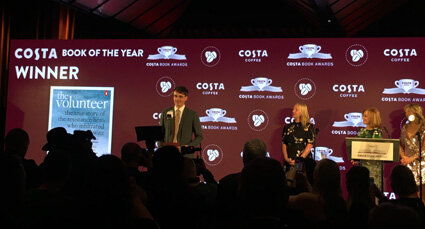Several months ago I posted about being a judge for this year's Costa Book Awards in the First Novel category and I've been aching to talk about all the great books I've been reading. Today I am thrilled to finally announce our shortlist! I've read so many debut novels in the past few months. Judging a book prize is like a full time job – although obviously I enjoy reading as much as possible so it's really a labour of love and it was such a pleasure discovering so many new voices amongst the submitted books. It was also wonderful conferring with my fellow judges novelist Jill Dawson and Debbie James, owner and manager of Kibworth Books. I wish I could gossip about heated arguments and falling out with each other, but honestly we got along brilliantly. They are such intelligent and sympathetic readers that it was really a joy discussing a huge range of novels with them. Given the circumstances we couldn't meet in person but we spoke for multiple hours over video call to discuss an incredible range of novels. Judges always say this, but it was honestly such a difficult decision when it came down to selecting certain books over others. I'm excited and proud to reveal the four novels we selected for the shortlist.
The novels are “Big Girl, Small Town” by Michelle Gallen, “The Family Tree” by Sairish Hussain, “Love After Love” by Ingrid Persaud and “All the Water in the World” by Karen Raney.
We were absolutely unanimous in these choices. After having such an in-depth conversation about so many books we decided the best way to pick the shortlist was to each create a pile of four books off camera which we'd reveal to each other simultaneously. We did this and all three of us had picked the same four novels. So that decided it! I know there's often a lot of politics around book prizes and speculation about favour being shown to certain types of books, but we honestly picked these because of the strength of the writing and the power of their storytelling. Reading each of these four novels was a completely absorbing experience and I'd enthusiastically give them to any friend, family member or stranger to read.
You know I love following book awards. Since there are different categories for the Costas I get the best of both worlds with this prize as I've got to be a judge but I'm also delighted to see what books have been listed in the other categories. The full list has been published on the Costa Book Awards' website but I am especially thrilled to see Monique Roffey's novel “The Mermaid of Black Conch” shortlisted for the Novel Award. It's one of my favourite books that I've read this year and it's fantastic to see it receive this recognition. There are many on the other shortlists I'm eager to read over the Winter holidays including books by Susanna Clarke, Tim Finch, Julian Barnes, Rachel Clarke, Lee Lawrence, Rachel Long and others.
The winners in each category will be announced on January 4th. Also, between each category winner an overall winner will be announced on January 26th. Last year's overall winner “The Volunteer” by Jack Fairweather was an incredibly powerful true story about the resistance hero who infiltrated Auschwitz. So I'm excited to see which book is selected for this year's prize. In the meantime, I'm so excited to follow discussions about the shortlists and reader reactions to the First Novel category in particular. I hope you love reading them as much as I did. Let me know what you think in the comments if you've read any of these books or if you're interested in reading them.












